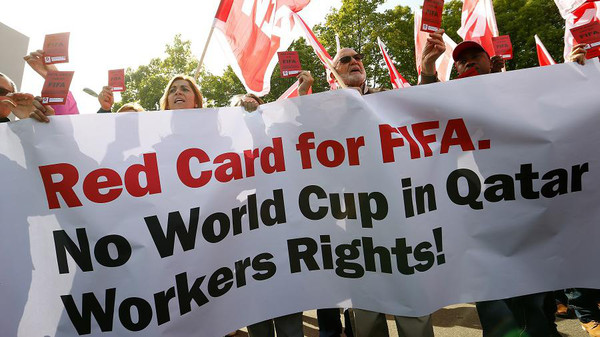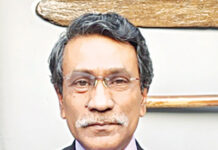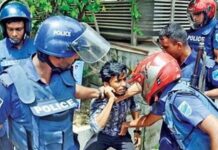Qatar will be the host of the 2022 FIFA World Cup, the first Arab country to do so, as they hosted the 2006 Asian Games.
This piece will attempt to examine the country’s social and legal infrastructure; and the justification it may have to host a very prestigious sporting event as Qatar itself has not known to be any footballing nation by any measure.
Qatar is one of the six oil rich states bordering the Persian Gulf, collectively known as gulf Arab states. Most of them have constitutional monarchies with elected parliaments. Qatar has absolute monarchy with a semi-elected Majlis al Shura that has very limited legislative authority giving its Emir the final say on all matters. The Qatari society is known to be a conservative one, at par with Saudi Arabia.
It has the world’s third largest natural gas reserves and oil reserves in excess of 25 billion barrels, and it is one of the world’s richest countries per capita. It has been pouring in billions into improving its infrastructure to promote tourism.
Qatar’s legal system is a mixture of civil law and Sharia, which is also one of the sources of Qatari legislation. The law that governs its migrant workers and residence status is known as Kafala Sponsorship System
This is known to effectively restrict each of its 1.4 million migrant workers to a single employer. It gives the sponsors autocratic power to cancel workers’ residency permits, deny workers’ ability to change employers, report a worker as ‘absconded’ to police and deny permission to leave the country. Sponsors may restrict workers’ movements resulting in them being fearful to report abuses or claim their rights. Effectively this is forced labour exaction that makes impossible for a migrant worker to leave an abusive employer or leave the country without permission. The system has been termed as an “open jail” by a foreign diplomat.
Qatar’s workplace injuries or casualties are the third highest cause of accidental deaths. It does not have national occupational health standards or guidelines and there is no wage standard for its immigrant labourers.
As of 2005, certain provisions of the Qatari Criminal Code allowed punishments such as flogging and stoning which constituted a breach of UN Convention Against Torture. It also retains death penalty.
Qatar has embarked on a construction boom and the country is undergoing preparations of the 2022 FIFA World Cup. This has reportedly led to an increase in human rights abuses. The 2013 Amnesty International reports showed a horrific pictures where it reported that migrant workers were not paid their dues in time, or at all, leaving them to go hungry and were ‘treated like cattle’. The Guardian reported (based on documents obtained at the Nepalese embassy) that dozens of Nepalese migrant labourers had died in Qatar in just a few weeks around September 2013, while thousand more were enduring appalling labour abuses.
FIFA has been reported to have investigated these abuses but has taken no action to pressure Qatar to improve its workers’ conditions.
The current FIFA’s policy, that was used for the selection of the 2010 (South Africa) and 2014 World Cup (Brazil) hosts is that the six world confederations— corresponding to continents—would rotate in turn of providing bids, for a particular hosting, from within their member national associations. This was revised further in 2007 to bar for bidding the last two World Cup host confederations.
FIFA Executive Committee, with one vote each for all eligible members, voted to decide the 2018 and 2022 venues. The multiple round exhaustive ballot system eliminated countries receiving fewest votes in each round until a single candidate emerged. FIFA President Sepp Blatter had the deciding vote, in the event of a tied vote. There are 24 members in the Committee, but two of those were suspended due to accusations of selling votes.
Qatar made a bid for only the 2022 World Cup. Sheikh Mohammed bin Hamad bin Khalifa Al-Thani, son of the present Emir of Qatar, was the chairman of the bid committee. Qatar promoted the proposal as an Arab unity bid and drew on support from the Arab world. This was viewed as their opportunity to bridge their gap with the West.
There were concerns with Qatar’s extreme temperature with day time high in excess 40 °C and average daily low temperatures above 30 °C in June. Sheikh Hamad however assured of technological provisions to counter it with other plans ‘up our sleeves’.
Sepp Blatter endorsed the Qatari bid. “Arabic world deserves a World Cup” Blatter was quoted to say and cited the country’s enormous progress in its population and infrastructure. The Qatari Asian Football Confederation (AFC) President vowed to stand by his country’s bid declaring that he would give his vote to Qatar.
However, in May 2011, The Sunday Times reported that two committee members, Issa Hayatou and Jacques Anouma were given $1.5 million in exchange for their votes in favour of Qatar and submitted evidence to FIFA.
Sepp Blatter rejected the evidence in a press conference. An e-mail was leaked from FIFA General Secretary Jérôme Valcke which suggested that Qatar had “bought” the rights to host the Cup. Valcke denied that it was bribery, saying that Qatar had “used its financial muscle to lobby for support.”
Apart from Qatar’s abysmal record of human rights violation of its migrated labour, unsuitable temperature and serious allegations of corruption in obtaining the bid what else is there to consider (or reconsider) whether the country is a fit venue for an event like FIFA World Cup?
A recent International Trade Union Confederation (ITUC) Report described Qatar as a country without a conscience. The report went on to write that fundamental rights and freedoms do not exist for foreign workers there.
Poor migrant workers live in squalor, and are forced to work long hours in unbelievable heat six days a week. Kept in an apartheid situation they are dying in unprecedented numbers.
Their embassies are forced to keep quiet about the mass deaths of their citizens out of fear of retaliation. They have been urged to play down or deny work-related fatalities with the threat of turning off the flow of remittances from Qatar to home. Workers imprisoned in crowded and unhygienic detention centres are denied full access to their emissaries and records of who has been detained are made unavailable.
There is no effective labour compliance system in what is effectively a police state.
The ITUC visited several thousand workers in ten labour camps to the east run by slum landlords who rent those out to companies. These camps had no access to fresh water.
The Industrial Area is a grid of 52 streets lined in single and sometimes double storey buildings with rooms of eight to 12 workers, one toilet and washing area and one kitchen. Of the 60% of its residents, Nepali migrant workers, many said were treated like animals, living like horses in a stable.
Since the World Cup was awarded in 2010, 1,200 have already died, reportedly out of heat, exhaustion or overwork. On average 35 migrant workers died per month in 2013. The figure goes up in August, the hottest month of the year.
In the years leading up to the 2022, estimated 500,000 workers will be further recruited from India, Bangladesh or Nepal for the project that has a $200 billion infrastructure spending plan tied to the football tournament.
It is also estimated that, out of this, 4,000 will simply die, either due to overwork or due to the subhuman condition they will be made to face. This forecast is based on the mortality trend data kept by the Indian and Nepalese Embassies in Doha.
Compare this with the workers who died in South African World Cup (two deaths) and Beijing Winter Olympics (10 deaths) in 2010. Whether the cause of death is labelled as work accidents, heart attack brought on by the life threatening effects of heat or disease from living in squalid conditions, the root cause remains the same: substandard working condition.
Qatar undoubtedly has the financial means to support important reforms and take up measures to improve its working condition. FIFA has expressed many times that it expects international norms to be followed by all host nations. The 2022 WC can trigger positive social changes in Qatar including improved labour rights and condition of migrant workers.
People all over the world hope that FIFA and 2022 WC can become catalysts to these changes. The ITUC has recommended the following:
• End of the current sponsorship (kafala) system;
• Introduce laws to allow freedom of association and collective bargaining for all workers in Qatar;
• Put in place effective grievances procedures;
• Clean up the recruitment system and work with responsible international recruitment agencies; and
• Ensure a minimum living wage, and end the race-based wage discrimination which is rife in Qatar.
Recently the Qatari government announced changes to its labour laws to give workers more rights and freedoms. International labour organisations are however are not very impressed as it is noted that there are no timeframe for its implementation and hence insist that the country has only rebranded its current system with a new name, and that’s all.
No moves were announced to stop the death and injury amongst the migrant workers. So, these reform proposals may just be used to recruit staff as the World Cup infrastructure programme expands.
As we are keen to watch international football competitions, we should remain alert to these developments. Ethics and fair play are central in the conduct of hosting the event. The viewer’s possible revulsion against a blood stained tournament will in the long run harm FIFA’s credibility and will affect the tournament in lesser revenues, lost reputation and disinterest in the game of international football as a whole.
Source: UNBConnect










